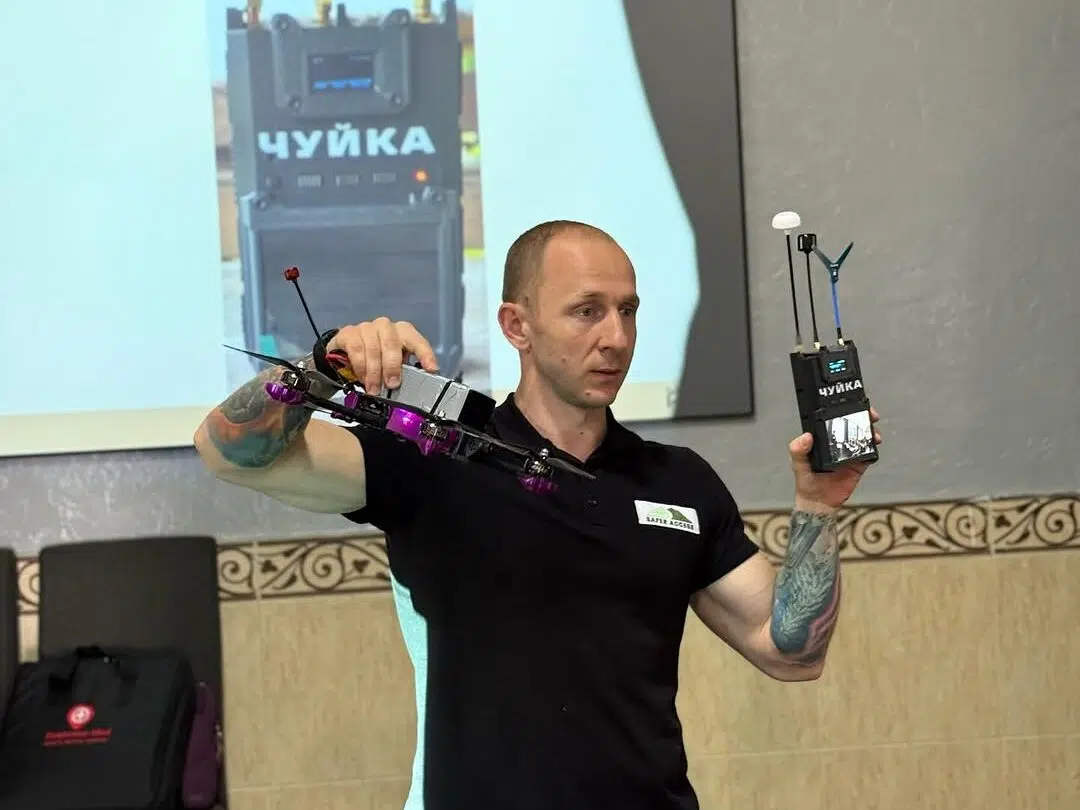Nonviolent Peaceforce Rolls Out Frequency Analysers in Ukraine to Help Protect Civilians from Attacks
Early warning technology enables humanitarian teams and local volunteers to save lives amid surging drone threats

Odesa, Ukraine, 4 August 2025 – As relentless drone attacks escalate and endanger civilians and humanitarian personnel in Ukraine, Nonviolent Peaceforce (NP) is working with frontline responders and communities to use frequency analyser (FA) technology to enhance rapid, real-time detection of threats, and bolster the safety of humanitarian responses.
Since Russian forces’ full-scale invasion in 2022, Ukraine’s humanitarian landscape has been reshaped by the frequent lethal use of first-person-view (FPV) attack drones. According to UN records, such attacks have killed nearly 400 and injured over 2,600 civilians between February 2022 and April 2025, making drones the leading cause of both civilian and aid worker casualties in recent months. In dense major urban centres like Kherson and Kramatorsk, up to 700 weekly drone attacks have been reported, making the environment for humanitarian response unprecedentedly dangerous. Communities are increasingly aware of the buzzing and looming threats of attack posed by drones, making that a significant part of their daily reality.
“We have repeatedly witnessed the tragic consequences when our partners’ teams lacked real-time situational awareness of aerial drone threats while evacuating civilians or distributing life-saving aid. It became clear that we needed proactive measures—tools that adapt as fast as the threats themselves,” said Anastasiya Marchuk, NP’s Head of Mission in Ukraine.
In close coordination with local humanitarian networks, NP has now enhanced its ‘Duty of Care’1 package by including frequency analysers, which scan airwaves for attack drone signals, immediately alerting teams to potential threats. This brief warning window enables essential safety measures: such as pausing an aid delivery, sheltering in place, or altering evacuation routes. In recent cases such split-second decisions, prompted by FA alerts, have prevented injuries and potential loss of life during evacuations.
“While protective equipment, like ballistic vests and helmets, helps reduce the impact after a drone strike occurs, frequency analysers’ critical advantage is that it can help reduce exposure to FPV threats before contact happens. For local humanitarian workers operating in these environments daily, this technology represents the difference between being merely reactive and being proactive in protection measures. We are committed to ensuring that these tools and practices are not only available and effective but used responsibly by partner networks." stated Yomi Kleinmann, NP’s Senior Programme Manager in Ukraine.
NP, together with Ukrainian partners, has selected FAs specifically designed to allow software and hardware upgrades, ensuring ongoing relevance as drone technologies shift.
One fundamental characteristic of FAs is that they are passive monitoring tools: they do not jam or interfere with drone signals and cannot be adapted to active engagement. Their use complies with International Humanitarian Law, Do No Harm principles, and upholds NP’s mandate of nonpartisanship. NP’s provision of FAs includes comprehensive training for partners: not just on technical use, but on integrating FAs into safety, security, and early warning, early response systems, with clear boundaries on information sharing and asset use to support both humanitarian actors and communities from potential risks.
“The technology is only as effective as the trust underpinning its use. That’s why we accompany every FA with a robust accountability framework, monitoring, and ongoing dialogue to ensure principled, lifesaving use,” emphasized Marchuk.
This initiative arose directly from requests by Ukrainian local networks seeking sustainable ways to reduce casualties among their teams and the civilians they serve. Their input shaped every stage, from needs identification to strategy development, training curriculum, and finally the selection of FA models.
Through a phased rollout, NP is providing 20 frequency analysers to humanitarian responders operating in frontline areas.
"Every day, our teams head out knowing a life-threatening drone could appear out of nowhere. We know these threats, but we accept them to help our people as we're out there doing the work – with the FAs we have better awareness and information about what's around us. It lets us keep doing what we need to do, but now with more knowledge so we can make the right calls to stay safe. We feel supported, not as numbers in a report, but as real people doing this real work on the ground," said Bogdan Zuyakov, founder and director of the Kramatorsk Association of Volunteers (KAV), based out of Kramatorsk, in Donetsk Oblast, Ukraine.
Thanks to funding from UNOCHA’s Ukraine Humanitarian Fund, and the Swiss Agency for Development and Cooperation (SDC), all FA options were locally sourced in Ukraine, which further supports local markets.
Looking beyond Ukraine, NP is already sharing lessons learned with international partners and other country offices, providing a case study in responsible, community-centred technological innovation for civilian protection—a model applicable in modern conflict zones worldwide.
Nevertheless, NP stresses that no amount of protective technology can replace the core legal requirement for parties to conflict to uphold international humanitarian law, and to protect civilians and humanitarian workers from indiscriminate attacks. The use of FAs only aims to mitigate the unacceptable practice of targeting those protected by international law, not normalise it.
- NP ‘Duty of Care’ package includes personal protective equipment (ballistic vest and helmet), life insurance, psycho-social support, first aid training and individual first aid kits, training on humanitarian principles. In frontline areas, NP also supports procurement of armoured vehicles for local partners. ↩︎
ABOUT NONVIOLENT PEACEFORCE:
Nonviolent Peaceforce (NP) is an international protection agency. Our mission is to protect civilians in violent conflicts through unarmed strategies, build peace side-by-side with local communities, and advocate for the wider adoption of these approaches to safeguard human lives and dignity. NP's duty of care programming aims to reduce the physical risks volunteers are exposed to as well as support the psychological resilience of volunteer networks and the communities they serve.
For media inquiries, please contact Mahmoud Shabeeb, NP’s Global Media Adviser, at [email protected].
